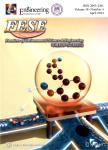Water-dispersible nano-pollutions reshape microbial metabolism in type-specific manners:A metabolic and bacteriological investigation in Escherichia coli
作者机构:Guangdong Provincial Key Laboratory of Chemical Measurement and Emergency Test TechnologyGuangdong Provincial Engineering Research Center for Ambient Mass SpectrometryInstitute of AnalysisGuangdong Academy of Sciences(China National Analytical Center Guangzhou)Guangzhou 510070China Shandong Provincial Key Laboratory of Molecular EngineeringSchool of Chemistry and Chemical EngineeringQilu University of Technology(Shandong Academy of Sciences)Jinan 250353China KLGHEI of Environment and Energy ChemistrySchool of ChemistrySun Yat-sen UniversityGuangzhou 510275China
出 版 物:《Frontiers of Environmental Science & Engineering》 (环境科学与工程前沿(英文))
年 卷 期:2022年第16卷第9期
页 面:53-64页
核心收录:
基 金:support from the projects of the National Natural Science Foundation of China(Nos.22006143,21806189) the Science and Technology Program of Guangzhou(China)(No.202102020601) the Natural Science Foundation of Guangdong Province(China)(No.2021A1515012336) the Guangdong Provincial Key R&D Programme(China)(No.2020B1111350002) the special project of Guangdong Enterprise Science and Technology Commissioner(China)(No.GDKTP2021011600)
主 题:Nano-toxicity Nano-plastics Quantum dots Microbial metabolite Metabolic dysregulation
摘 要:Incomplete separation and recycling of nanoparticles are causing undesirable nanopollution and thus raising great concerns with regard to *** microorganisms are important regulator of physiological processes in many organisms,the interaction between nanopollution and microbial metabolomics and the resultant impact on the host’s health are important but *** investigate how typical nanopollution perturbs microbial growth and metabolism,Escherichia coli(***)in vitro was treated with six water-dispersible nanomaterials(nanoplastic,nanosilver,nano-TiO 2,nano-ZnO,semiconductor quantum dots(QDs),carbon dots(CDs))at human-/environment-relevant concentration *** nanomaterials exhibited type-specific toxic effects on *** *** metabolite profiling was used to characterize metabolic disruption patterns in the model microorganism exposed to different *** percentage of significant metabolites(p1)accounted for 6%–38%of the total 293 identified metabolites in each of the nanomaterial-contaminated bacterial *** results also exhibited significant differences between different nanopollutants and dose levels,revealing type-specific and untypical concentration-dependent metabolic *** metabolites responsive to nanopollution exposures were mainly involved in amino acid and purine metabolisms,where 5,4,and 7 significant metabolic features were included in arginine and proline metabolism,phenylalanine metabolism,and purine metabolism,*** conclusion,this study horizontally compared and demonstrated how typical nanopollution perturbs microbial growth and metabolomics in a type-specific manner,which broadens our understanding of the ecotoxicity of nanopollutants on microorganisms.



